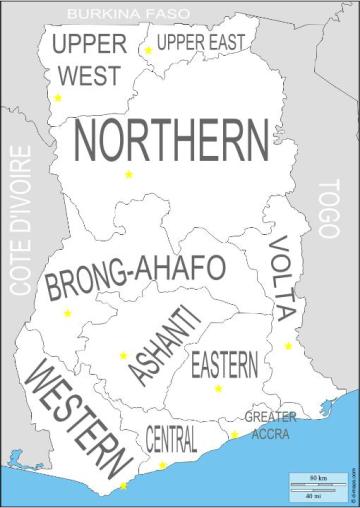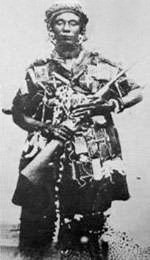Where is Ghana?
Ghana is a nation on West Africa’s Gulf of Guinea, bordered on the west by Cote d’Ivoire, on the north by Burkina Faso, and on the east by Togo. Geographically split between dry, sub-Saharan desert to the north and lush sahelian rainforest to the south, Ghana boasts a diverse and dynamic culture united by their focus on community. Because Ghana is only a few degrees north of the equator, it has a fairly consistent tropical climate year-round, with temperatures ranging from around 80-90°F (26-32°C) and high humidity. Sunrise and sunset times tend to stay around 7am and 7pm year-round. Ghana has two seasons: rainy and dry.
Ghana is split geopolitically into ten administrative regions (north to south):
- Upper West
Capital: Wa
Population: 18,476 - Upper East
Capital: Bolgatanga
Population: 8,842 - Northern
Capital: Tamale
Population: 70,384 - Brong-Ahafo
Capital: Sunyani
Population: 39,557 - Ashanti
Capital: Kumasi
Population: 24,389 - Western
Capital: Sekondi-Takoradi
Population: 23,941 - Central
Capital: Cape Coast
Population: 9,826 - Eastern
Capital: Koforidua
Population: 19,323 - Volta
Capital: Ho
Population: 20,570 - Greater Accra
Capital: Accra
Population: 3,245
Ghana Timeline
Pre-1200s | The land that will become Ghana is largely uninhabited in the south, but the culture and people groups consist of several predominantly Akan kingdoms like the Ashanti Empire and Denkyira (den-CHEE-ra) kingdom.
1200s-1400s | The Ashanti Kingdom slowly solidifies into an Empire with its capital at modern-day Kumasi through highly lucrative and successful trade routes with other sub-Saharan kingdoms (some of which were conquered by the Ashanti Empire) as well as with North African cultures, crossing the Sahara desert to trade gold.
Early 1400s | Portuguese ships land at what is now Elmina in the Central Region, and begin trading with Ashanti and Denkyira gold traders. Initial European contact is purely economical, and business is conducted with mutual respect.
1481 | King John II of Portugal commissions the construction of Elmina Castle.
1598 | Dutch traders arrive and construct forts for trading.
1617 | Tensions between Portuguese and Dutch traders spill over, and the Dutch capture a satellite fort at Olnini from the Portuguese.
Mid-1600s | Other European countries begin trading gold with what would become Ghana, notably Sweden, Denmark, and, further to the east, Germany.
1600s-Late 1800s| The Transatlantic Slave Trade takes hold of both Europe and Africa, and human cargo replaces gold as the most desirable export out of what will become Ghana. Millions of Africans are shipped to Europe, the Caribbean, and North America as slaves, and hundreds of thousands perish in the cruellest, most brutal period of injustice and inhumanity in recorded history. European slavers are assisted by African slavers, mercenaries, and even kings, who barter goods for criminals, prisoners of war, and other men, women, and children. Of these collaborators, the Ashanti Empire is perhaps the most volatile and powerful.
1800s | Great Britain establishes control over much of the country, declaring it the British Gold Coast, and sparking some conflict with the Ashanti Empire.
1800s-1900s | The Ashanti Empire resists British colonial rule, and several battles and skirmishes take place over the course of nearly a century, many resulting in British defeat. Yaa Asantewaa, the Queen Mother, successfully leads her people to resist British colonialism until her defeat in the War of the Golden Stool in the early 1900s, a mere 50 years or so before Ghana’s independence.
1902| Yaa Asantewaa is imprisoned for weeks in a tiny confinement cell without light or airflow, but refuses to die, and is instead exiled to the Seychelles with her son, the deposed king of Ashanti, where she dies in 1921.
1909| Kwame Nkrumah, who will lead Ghana to its independence from Britain, is born in the small village of Nkroful.
1947 | The United Gold Coast Convention calls for self-governance while Kwame Nkrumah’s political party, the CPP (Convention People’s Party) runs a ticket calling for independence now.
1951 | Kwame Nkrumah is elected the first Prime Minister and President of Ghana.
1957 | On 6 March, 1957, Kwame Nkrumah officially declares Ghana’s independence from Britain, and Ghana is recognized as a sovreign nation. Nkrumah begins establishing infrastructure that better befits the newly established country, and speaks at length on the importance of Pan-Africanism.
1966 | Kwame Nkrumah is overthrown by Col. Emmanuel K Kotoka and Lt. General Joseph A Ankrah on 24 February 1966 and exiled to Conakry, Guinea, where he died in 1972.
1966-1981 | Ghana experiences a flush of civilian and military governments with inconsistent and often ineffectual policies, until Jerry John Rawlings took power in 1981 and began his administration with the suspension of the Ghanaian constitution and the banning of political parties until 1992, when he was reelected in democratic general election.
1981-2000 | Jerry John Rawlings begins reforming Ghanaian government and economy, and is reelected as president twice–once in 1992 and again in 1996.
2000-Present | Ghana experiences a brief period of economic stability in the mid-2000s, that is cut short by poor administrative choices and unsustainable exportation of power generated through the Akosombo Dam, at the mouth of Lake Volta. Currently, Ghana is experiencing high levels of inflation, inconsistent power supply, and dwindling access to running water. However, many Ghanaians retain high hopes and expectations for the future, and looking forward to the next presidential election in 2016.
Ghanaian Education & Language
The education system in Ghana is comprised of two main cycles: “basic education,” which consists of kindergarten, primary, and junior high school; and “secondary education,” which consists of senior high school. There is a tertiary level, which consists of college or university education, and is only available to students who score well enough to be accepted, and can afford the tuition.
Similarly to elementary schools in the United States, Ghanaian basic education is nominally funded by the government, which covers the cost of enrollment and some supplies for students and teachers. Senior high schools are not funded by the government, but are largely subsidized. However, many families find the cost of senior high school too high, resulting in many qualified students being denied an education based on cost.
There are two main exams Ghanaian students must take in order to advance in their schooling. The first is the BECE (Basic Education Certificate Examination), conducted at the termination of junior high school. The BECE determines what senior high school (if any) the student qualifies for. In some circumstances, the senior high school for which they qualify may be in another village, city, or even administrative region. Boarding costs or transportation can also be prohibitive for families struggling to pay the GHc 1,000 or more tuition fees.
The second exam is the WASSCE (West African Secondary School Certificate Examination), which must be taken at the finish of senior high school to determine their qualification for a bachelor’s degree program at a university. If students do well, they will likely attend a public or government-funded university, as private universities in Ghana are far less prestigious.
For Ghanaian university graduates, the next step is often to pursue a master’s or doctorate degree in their field. Many students graduating from an undergraduate class will already have plans to pursue their master’s degree.
Language
Although Ghana is the size of Oregon in the US, there are some 46 distinct languages spoken nationwide. Each region has its regional “lingua franca,” but in some areas it is not uncommon to meet an ordinary Ghanaian conversationally proficient in at least three, sometimes up to six or seven, different languages.
While Ghanaians may be generally fluent in several languages when it comes to listening and speaking, the difficulty arises largely in reading and writing local languages. This is only compounded by the emphasis placed on English comprehension and fluency in schools. What ends up happening is that Ghanaians will be able to read and write English with fair fluency and comprehension, but because they rarely use English to speak with friends, family, neighbors, coworkers, etc., they struggle at pronunciation and conversation. On the other hand, they are perfectly fluent at hearing and speaking their native language–the language that was spoken to them from the time they were infants–but often cannot read or write a single word of it.
While we cannot currently assist communities in all 46 languages, we recognize the problematic nature of this paradigm and hope to change it with community involvement and participation. It is for this reason that we have incorporated a focus on local language literacy education in our mission.












